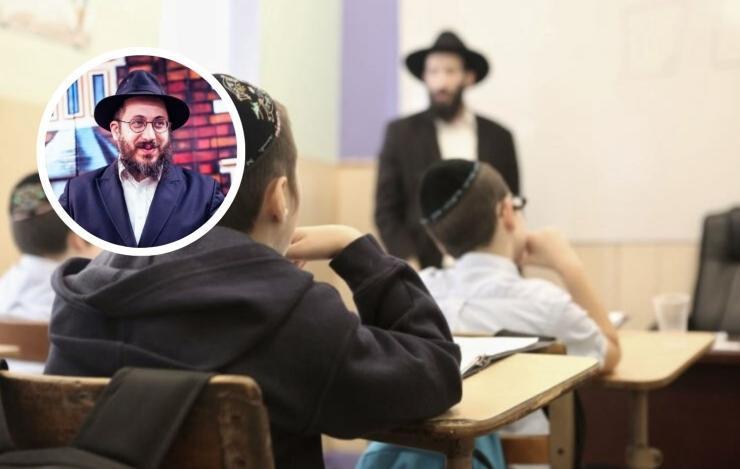Are Schools Meant To Teach Manners?
I am very impressed with the amount of knowledge that my children are learning and their intellectual skills that they are developing. I do not see an emphasis placed on basic derech eretz and I am told that these values are supposed to come from the home. Is that true or is the school supposed to partner with us in instilling these values? • Rabbi Gershon Avtzon answers in this week’s Chinuch and Moshiach column • Full Article
By Rabbi Gershon Avtzon
Question: I am, baruch Hashem, a mother of few school-age children. I am very impressed with the amount of knowledge that my children are learning and their intellectual skills that they are developing. A personal issue I have with the “system” is that I do not see an emphasis placed on basic derech eretz (focus on respecting parents, manners in the dining room etc.) and I am told that these values are supposed to come from the home. Is that true or is the school supposed to partner with us in instilling these values?
Answer: The short answer is a resounding “YES” – the school is definitely supposed to be a partner in instilling such middos and behavior and this is actually one of the main focuses of Torah-true chinuch. The following are some of the letters of our holy Rabbeim on the subject:
In Klalei Hachinuch v’haHadracha, the Rebbe Rayatz states: “A young child’s education and guidance differs from an older child’s. A young child’s education is primarily in cleanliness, modesty and in proper manners, that he not eat like a glutton, and in similar small, yet essential matters, for these constitute the main differences between an animal and a human being. An older child’s education and guidance is on a higher level. His education is chiefly [in the following areas:] to observe the recitation of basic blessings, [to cultivate a proper attitude toward] study, [and to develop] respect for others, to honor one’s parents and to obey one’s teachers.”
General Chinuch Goals
(1) “[It is our job] to educate the child to be a person that lives up to his title ‘man’ as opposed to an animal. First and foremost, this is expressed in the fact that a person is not bound by his natural desires, rather they control and quench their desires.” (Igros, Vol. 22 p. 495; #8644).
(2) “The purpose of [what Chassidus calls] the “Nefesh HaSichlis — the intellectual soul” is to enable the animal soul to understand how to control its emotional traits through intellect and reason. A child — both in years and =in knowledge — has very strong emotional drives while his intellectual capacity is modest. If his intellectual soul is drawn after its desires, even those which are permitted, [acting like] an animal, he has fallen from his level and is considered [spiritually] ‘dead. The purpose of chinuch is to set him up [on the path of] proper conduct.” (Igros, Vol. 2 p. 5; #170).
Respecting Parents
(3) In 5728 (1968), there was a huge controversy in Kfar Chabad as to which language that students in Cheder should be taught in. Some parents wanted Yiddish while others wanted Hebrew. After addressing the actual question, the Rebbe continued to say:
“It is my fervent hope that the energy that was aroused around the language controversy should be used out in the guidance of the students in developing their good middos and their growth of yiras Sahmayim. These things are usually not part of the official curriculum of what usually is taught in the classroom. These include (but not limited to): brachos, proper davening, respecting parents and elders, and how to properly interact with their own peers.” (Likkutei Sichos, Vol. 22, p. 411; Igros, Vol. 25 p. 108-109; #9465)
(4) In the early 1940’s the Rebbe Rayatz started a Yeshiva in Montreal Canada. On 13 Teves 5702 (1942), the Rebbe Rayatz sent a letter to the administration of the Yeshiva with detailed instructions on what should be the focus of their chinuch. Amongst the detailed instruction is the following: “It is very important to arouse in them a deep respect for those the learn Torah, elder people and especially in respecting their parents.” (Igros, Vol. 6 p. 169; #1686)
Proper “Table Manners”
(5) “Concerning the idea you write of, that the students in the school should be overseen while they are eating: It is correct and it is a necessity. For there are so many halachos and minhagim associated with eating, in addition to being able to teach them basic derech eretz.” (Igros, Vol. 12 p. 66; #3873).
(6) The above-mentioned letter echos a letter that the Rebbe Rayatz wrote in 5703 (1943) to Rabbi Zalman Gurary (who was in charge of the Yeshiva in New York at the time): “In general is would be a good idea to take ten minutes a day to talk to the younger students about the proper behavior during meal time (including the proper derech eretz in how to eat, etc.).” (Igros, Vol. 12 p. 207; #4557).
(7) In 5711, someone wrote a detailed report to the Rebbe about their educational institution, curriculum and techniques. The Rebbe responded with a number of comments. One of them were: “You do not mention in your report if you train the children in Derech Eretz like how to properly behave when eating and how to interact between friends.” (Igros volume 4 page 170 #914)
The Moshiach Connection:
The idea of Moshiach is, like the Navi Yeshaya says, that “The world will be filled with knowledge of Hashem.” This means that Torah values will permeate the way the entire world acts and operates.
We all must prepare for this reality by “living with Moshiach” in the final days of galus. By ingraining Torah values in our daily-life behavior, we are preparing ourselves for the Geula.
72
Join ChabadInfo's News Roundup and alerts for the HOTTEST Chabad news and updates!











































